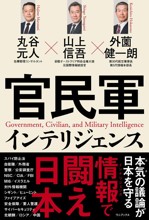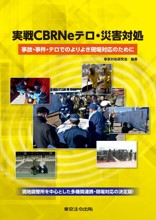 |
カウンターインテリジェンス−−防諜論
日本人の技術・財産・未来を守るために、スパイの実態から防諜の歴史・理論・法体系まで、情報のプロ(元防衛省情報分析官)と諜報のプロ(元警視庁公安部捜査官)が説く! |
 |
シギント - 最強のインテリジェンス
本邦初のシギント入門書!!シギントを知らずして、国際情勢は語れない!
※シギント(SIGINT: signals intelligence)とは、通信、電磁波、信号等など傍受を利用した諜報・諜報活動。
盗聴、ハッキング、国益を賭けた戦いの世界【インテリジェンス・ウォー】
繰り返す、これは架空【フィクション】ではない!
|
 |
官民軍インテリジェンス
本気の議論が日本を守る
情報(インテリジェンス)で闘え日本
今もっとも注目されている元外交官、前駐オーストラリア特命全権大使、山上信吾氏。外務省の情報機関・国際情報統括官であった山上氏と、防衛省情報本部長から、第30代航空幕僚長を務めた外薗健一朗氏。テロ対策・危機管理のプロとして、日本企業および日本人の「インテリジェンス」を高めるため危機管理コンサルタントとして日夜活動する丸谷 元人氏。外務省(官)、自衛隊(軍)そして民間からという全く新しい視点の3者によるインテリジェンス本。 |
 |
工作・謀略の国際政治 - 世界の情報機関とインテリジェンス戦
ガザ紛争、宇露戦争、中国、北朝鮮の動向、読み解く鍵は情報戦である!
国際政治における各国のインテリジェンス組織の裏面を詳細に解読する!
日本の実情、ガザ紛争、ウクライナ戦争、中国の監視システム
北朝鮮の暗殺組織 インドvsパキスタンの過激な情報機関、キューバ情報機関
|
 |
情報戦の教科書−日本を建て直すため『防諜講演資料』を読む
戦前の日本人に読まれていた『防諜講演資料』を、参政党党首・参議院議員の神谷宗幣がわかりやすく 現代語に書き記し、今の日本社会と照らし合わせて解説と提言を加えました。
情報、経済、メディア工作、スパイの実態など、目に見えない戦いは今も昔 も変わっていないことに驚きを隠せません! |
 |
国際情勢を読み解く技術
近年の紛争・戦争・国際政治の背景解読を軸に、ロシアの軍事・安全保障専家・小泉悠(東京大学先端科学技術研究センター准教授)とインテリジェンス・軍事ジャーナリストの黒井文太郎が、混迷の時代の情報収集・分析の手法について、対話形式で緊急解説する。フェイクの時代を生き抜く国際ニュースの情報分析術。陰謀論の時代、認知戦の時代をサバイブするための新しい情報学講座。 |
 |
元公安、テロ&スパイ対策のプロが教える! 最新リスク管理マニュアル 激増する国際型犯罪から身を守るために
これまでの常識では対応できない! 国際型犯罪、ますます巧妙になる特殊詐欺、忍び寄るハニートラップやスパイの最新手口を明かし、いかにして私たちの命や財産を守ったらいいのか教えます!
警視庁に20年以上勤務。主に公安部外事課で防諜対策や各国の日本大使館のセキュリティアドバイザーを務めてきた著者ならではのリスク管理術。
「特殊詐欺・強盗」「SNSに蔓延するニセ情報」「ストーカー」「狙われる機密情報」「忍び寄るハニートラップ」「チャイナ・リスク」など、本書では現実の犯罪事例を分析、解説するとともに防犯対策法を教えます! |
| |
|
| |
|
|
|
| |
|
| |
|
| |
|










